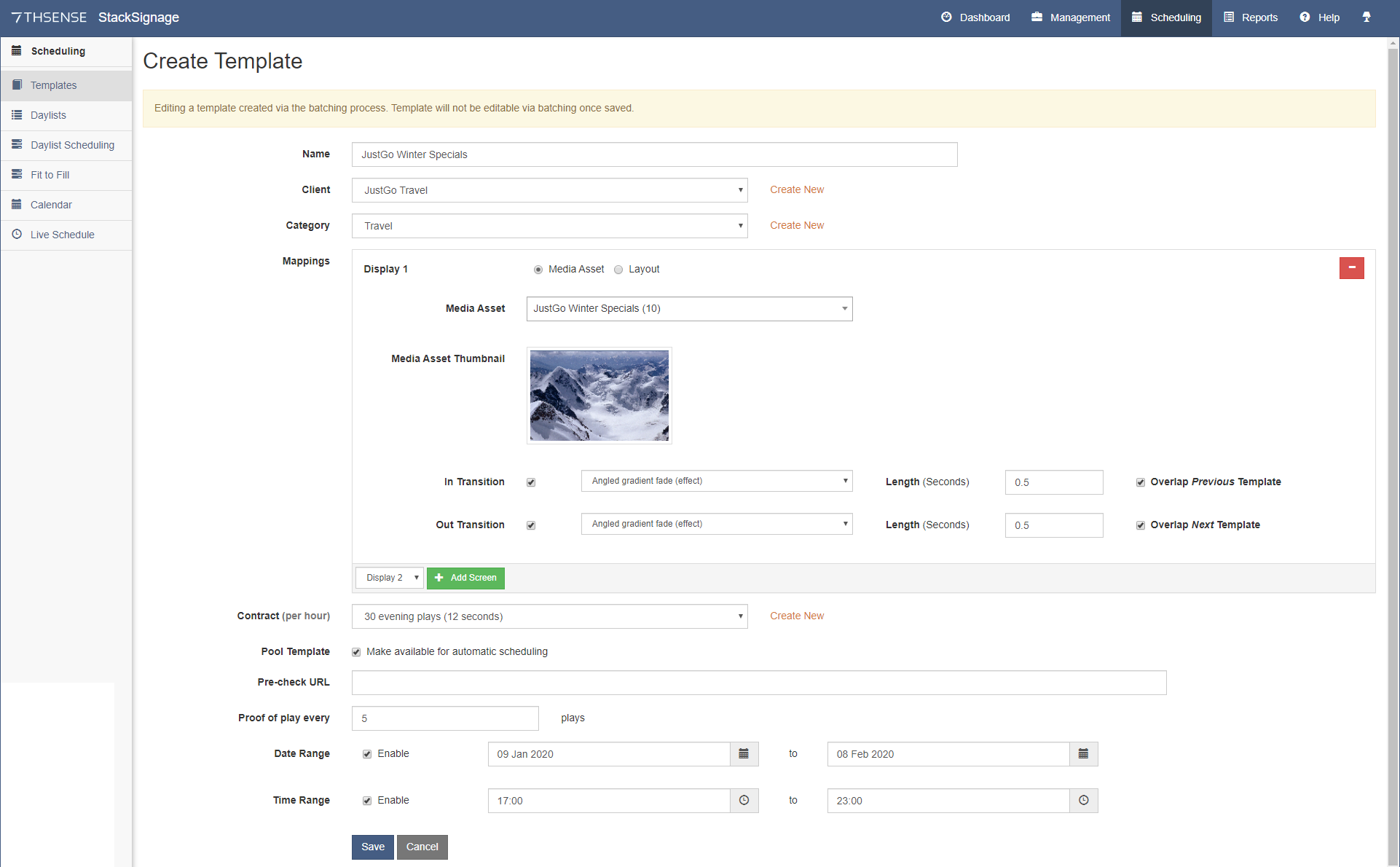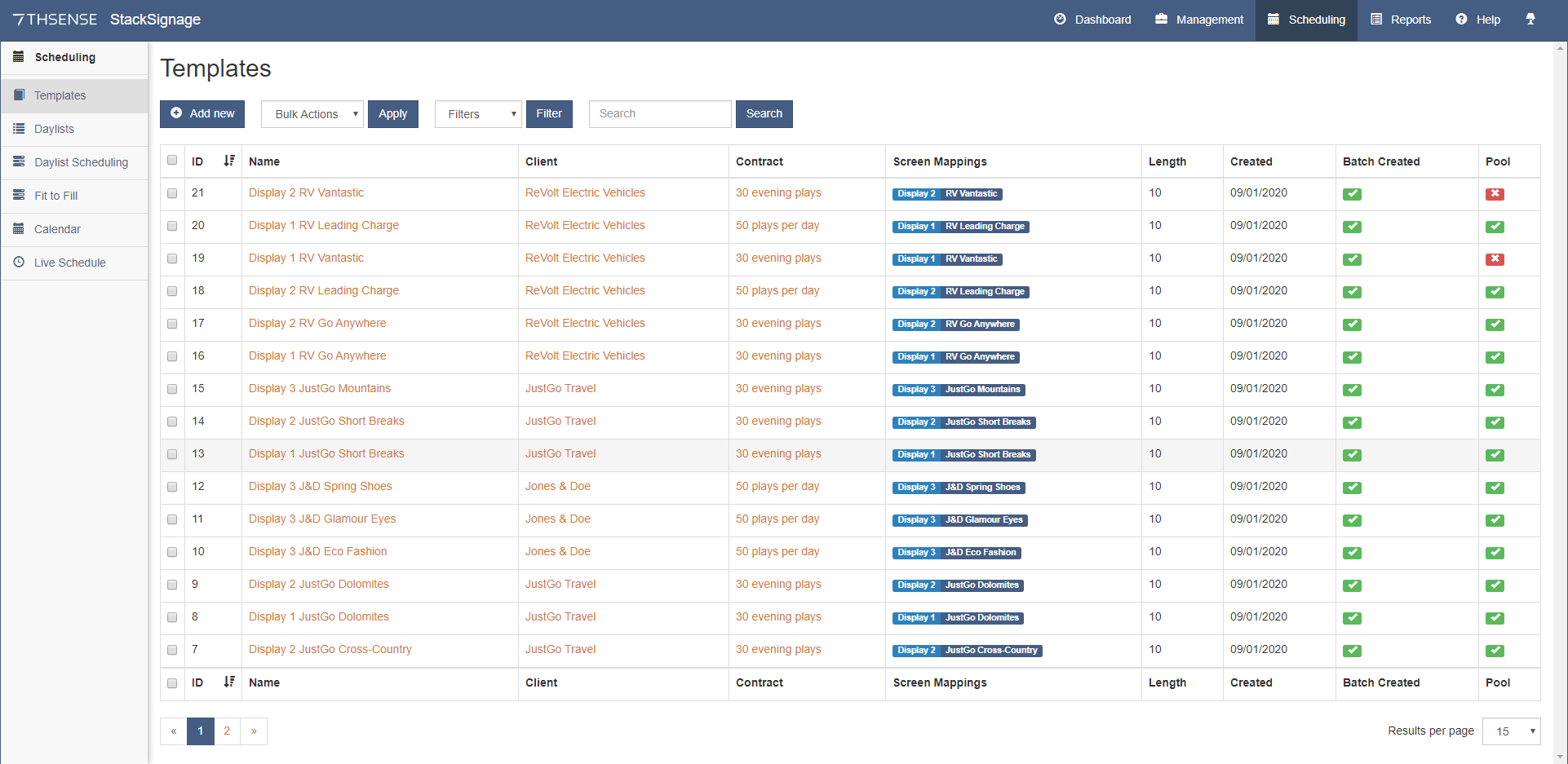Templates are the building blocks of the play Schedule.
•A Template should have a meaningful name, reflecting its purpose and/or to what it belongs (e.g. a campaign, or a client).
•The Client is named so that templates can be filtered and reported on by Client.
•The Template is assigned a Category, so that adjacent Templates of the same Category can be avoided in automatic scheduling.
•Media Assets are mapped to Screens. Remember, a Screen might be a whole video wall, or just an area in one, and that in a Screen, Zones are created within a Layout that can play different media resources simultaneously.
•Transitions and overlaps blend one Template into the next. Both are optional.
•A Contract determines the proportion of total plays in a day when autoscheduling.
•A Template assigned ‘Pool’ status will be automatically scheduled and distributed within its date /time restrictions, according to Contract and Category. A Template taken out of the Pool can only be scheduled manually.
Mapping Media Assets
Start by adding selecting a Screen from the list and clicking the green ‘Add’ button. (Screens can be deleted with the Red ‘minus’ button.)
If one Media Asset fills this Screen, select the ‘Media Asset’ radio button. If Media Assets will play simultaneously in separate Zones within a Screen (see: Layouts), select ‘Layout’.
Select the required Media Asset from the drop-down list, or in the case of a Layout, for each Zone listed for the Layout. Remember, if these are layered well, an unpopulated Zone will simply be filled by any larger Zone underneath.
If desired, enable Transitions you have set up for the beginning or end of the Template for each Screen included. Movie Transitions have a duration of their own; effects and images need you to define how long they take.
Overlapping a preceding or following Template with a Transition means the transition duration will be shared across the end of one Template and the start of another. Choose your strategy: always to overlap the start of following templates or always preceding templates: do not mix them. If no overlap is selected, the transition is enacted within the scope of the Media Asset.
Using automated scheduling?
Add a Contract: this will provide the required weighting is this template is pooled for automatic scheduling.
Click to tick the Pool Template option if you want to make the media available for automated scheduling. Fields below this choice apply only to pooled templates.
The Recheck URL option allows for you to add a link to your own php script to check for conditions of playback. For example, the clip will only be played if it is raining (weather report link). For more information on this functionality see Pre-check Template URL.
Proof of Play allows you to select how many times the clip will be played before a snapshot is taken. In this example, a snapshot will be taken every 5 plays of the clip.
Date and Time ranges define when the templates will show in your template listings. Templates remain on the system, so can be reinstated and/or edited for use at a later date if required.
Click the ‘Save’ button to save your Template. This will return you to the Templates list, showing the template that you have created:
Note now, that the Filter at the top allows you to separate the pooled and non-pooled templates. Non-pooled templates may simply be forward prepared, to be made pooled when you want them to be autoscheduled, or be manually scheduled at set times as required.
Once created, Templates can be edited and saved. If they represent a pattern regularly required for a Client, or seasonally, you can reuse them.
•Make sure your naming conventions are clear and meaningful.
•Filter Templates to list only active, archived, pooled or unpooled.
•Remove a Template from autoscheduling by unchecking the Pool checkbox. Add it back in, in the same way.
•Archive Templates by checking them in the list and using the Archive bulk Action.
•Recover archived Templates by checking them in the list and using the Recover bulk Action.
•Add new Templates at any time.

